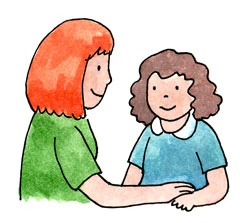 Teaching little children to share sometimes feels like a never-ending pursuit. Here’s some ideas to consider when teaching your children to think of others:
Teaching little children to share sometimes feels like a never-ending pursuit. Here’s some ideas to consider when teaching your children to think of others:
PREPARE AHEAD OF TIME.
Write up some simple questions and answers to memorize with your children. In other words, catechize them. This simple form of question-and-answer learning can take place at the lunch table or at other teachable, non-emotional moments when conflicts are not occurring. Little children will memorize quickly if you simply repeat a question and answer over and over at different times until it becomes familiar. Help them memorize one question until they know and understand the answer. Then move on to memorize the next question and answer.
Here are some questions and answers to get you started:
Q: How does God want you to treat others?
A: God says, “You shall love your neighbor as yourself” (Matt. 19:19b).
Q: Does God want you to serve others?
A: Yes, God says, “…through love serve one another” (Gal. 5:13).
Q: Who should you do good to?
A: The Bible says, “Let us do good to everyone” (Gal. 6:10).
Q: What does God say about honoring others?
A: “Outdo one another in showing honor” (Rom. 12:10b).
Q: What does God say about giving?
A: “It is more blessed to give than to receive” (Acts 20:35).
HELP YOUR CHILDREN PRACTICE.
Take time to help your children learn how to think of others. Help them practice. Ask them questions to help them think. Do this at times when they are not already in the midst of a disagreement.
Act out different situations with stuffed animals or dolls. What should happen when one person wants what the other person has? What should happen when several people want to play with the same item? Help them act out the right behavior and say the proper words. This can be a time of formal instruction, or just done casually when you are playing with them.
Walk the children through imaginary scenarios and have them practice doing and saying the right things while you coach them. What should they do and say if little brother wants to play with their new toy?
Stop them in the middle of a disagreement, quietly take them aside, and ask them what they should do. Ask some of your “catechism” questions to help them think. Then go back to the situation with them and walk them through the proper steps. (Doorposts’ Brother-Offended Chart can help with this.)
GIVE CUES WITH QUESTIONS AND CONVICT WITH SCRIPTURE
When a disagreement arises, ask your children the questions they have memorized. When a child is refusing to share a toy, ask him, “How does God want you to treat others?” He will then have the opportunity to instruct himself with God’s Word by answering, “You shall love your neighbor as yourself.” With these words and his previous practice and role playing, he may immediately know what he should do, or you may need to coach him a bit. If he needs help, give him instructions, and then expect him to follow them. Don’t allow him to disobey you while you instruct him.
With a little preparation ahead of time, you and your children should be better prepared to deal with the challenges of sharing with others.

7 Trackbacks